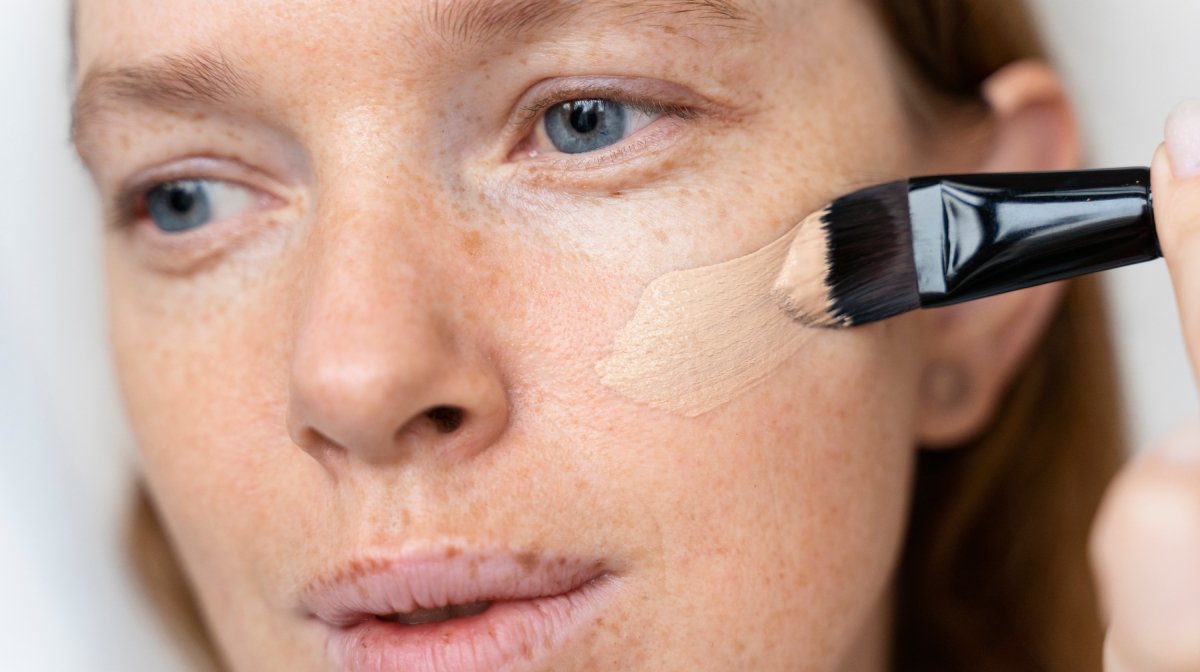
Is Foundation Bad for Your Skin
Is Foundation Bad for Your Skin? Separating Myths from Facts
When it comes to our skincare routines, foundation often plays a central role in achieving a flawless look. However, there’s an ongoing debate about whether this cosmetic staple is truly beneficial or detrimental to skin health. The truth lies somewhere between the two extremes – while some foundations can indeed pose risks to your skin, others can provide benefits when used correctly and in conjunction with a well-rounded skincare regimen. In this blog post, we will delve into the intricacies of foundation ingredients, its potential advantages and drawbacks, and how to use it safely to maintain healthy skin..jpg)
Understanding Foundation Ingredients
Foundation is a versatile cosmetic product that comes in various forms such as liquid, powder, cream, or stick, each designed to even out skin tone and create a smooth canvas for further makeup application. The composition typically includes pigments for coverage, emollients for a smooth application, preservatives to increase shelf life, and sometimes, SPF for sun protection.
Not all foundation formulations are created equal. Some may contain non-comedogenic ingredients that won’t clog pores, making them suitable for acne-prone skin. Others might integrate nourishing elements like antioxidants, vitamins, and hyaluronic acid which can hydrate, soothe, and even offer anti-aging benefits. However, certain components could irritate sensitive skin or trigger allergic reactions, emphasizing the importance of understanding your skin type and choosing products accordingly.
Benefits of Using Foundation
1.Sun Protection: Foundations with added sunscreen can shield your skin from harmful UV rays, which is crucial in preventing sun damage, premature aging, and skin cancer. Opt for products with at least SPF 30 for adequate daily protection.
2. Coverage: For individuals dealing with blemishes, hyperpigmentation, or uneven skin tone, foundation provides a layer of camouflage, boosting confidence and self-esteem.
3. Hydration and Nourishment: Many modern foundations now come enriched with skincare properties. These ‘skincare-makeup hybrids’ can deliver essential nutrients to the skin, helping to maintain its health and vitality.
4. Environmental Defense: By forming a protective barrier on the skin, foundation can help protect against environmental stressors like pollution and free radicals that contribute to dullness and accelerated aging.
Potential Risks of Foundation Use
While foundation offers several benefits, it’s not without its concerns:
A. Clogged Pores and Acne Breakouts: Heavy or oil-based foundations can potentially clog pores, leading to acne or exacerbating existing breakouts. Choosing water-based, non-comedogenic formulas and ensuring proper cleansing can mitigate this risk.
B. Irritation or Allergic Reactions: Some ingredients, particularly fragrances or certain chemical filters in sunscreens, can cause irritation or allergies. Always check the ingredient list and patch test new products before applying them to your face.
C. Masking Issues Rather Than Treating Them: Over-reliance on foundation to hide skin issues instead of addressing them through targeted skincare treatments can lead to long-term problems. It’s crucial to treat the underlying causes of skin conditions alongside using cosmetics.
Tips for Safe and Healthy Foundation Use
1. Skin Type Specificity
Choose a foundation that matches your skin type – lightweight, oil-free options for oily skin; moisturizing, hydrating formulas for dry skin; and hypoallergenic, fragrance-free versions for sensitive skin.
2. Skincare Integration
Ensure you have a consistent skincare routine including cleansing, toning, moisturizing, and applying serums or treatments that target specific skin concerns. This lays a strong foundation (pun intended) for healthy skin under makeup.
3. Prime Your Canvas
Before applying foundation, ensure your skin is clean, toned, and moisturized. A primer can help create an even base, filling in fine lines and pores, while also extending the wear time of your foundation. Choose a primer tailored to your skin concerns – whether it’s pore-minimizing, hydrating, or color-correcting.
4. Apply Wisely
Use a clean tool suitable for your preference – such as a brush, sponge, or fingers – and apply foundation sparingly, starting from the center of your face and blending outward. Remember, less is often more; layer the product as needed for desired coverage. Over-applying can lead to congestion and breakouts, especially around sensitive areas like the T-zone.
5. Sun Protection Factor (SPF)
Incorporate sun protection into your foundation by choosing a product with at least SPF 15. This not only shields your skin from harmful UV rays but also helps prevent premature aging. However, don’t solely rely on foundation for sunscreen; always use a dedicated sunscreen underneath for ample protection.
6.Regular Cleaning & Replacement
Maintain hygiene with your makeup tools to avoid bacterial buildup. Clean brushes and sponges regularly, and replace them every few months. Also, remember to remove your foundation before bedtime, allowing your skin to breathe and regenerate overnight.
7. Listen to Your Skin
Pay attention to how your skin reacts to different foundations. If you notice redness, irritation, or breakouts, it may be time to reassess the formula you’re using. Switch to hypoallergenic, non-comedogenic options if necessary.
By understanding your skin’s unique needs, priming correctly, applying foundation thoughtfully, integrating sun protection, maintaining cleanliness, and being responsive to your skin’s feedback, you can transform foundation from a potential skin hazard into a powerful ally in achieving healthy, glowing skin. So, choose wisely, apply smartly, and let your foundation work wonders for your complexion!
Alternatives and Solutions
A. Lighter Coverage Alternatives: Consider using BB creams, CC creams, or tinted moisturizers for days when you desire less coverage but still want to even out your skin tone or add a touch of sun protection.
B. Primer and Setting Sprays: Primers can help your foundation last longer and improve its adherence to the skin, while setting sprays can lock in your look without adding extra layers that might be heavy or pore-clogging.
C. Investment in Quality Products: Prioritize foundations with high-quality, skin-friendly ingredients. Look for brands that prioritize transparency about their formulations and avoid harsh chemicals, parabens, and sulfates.
Conclusion
Foundation itself isn’t inherently bad for your skin; rather, its effects largely depend on the product choice, usage habits, and individual skin needs. The key is to strike a balance between enhancing your appearance and nurturing your skin’s health. By being informed, selecting the right products, and maintaining a solid skincare routine, you can enjoy the benefits of foundation without compromising the integrity of your skin.
Call-to-Action
As you navigate the world of foundation and skincare, remember that seeking professional advice can be invaluable if you’re dealing with specific skin concerns. Always patch test new products and pay attention to how your skin reacts. Ultimately, a beautiful complexion starts with healthy skin, and with the right knowledge and tools, you can achieve both simultaneously.

